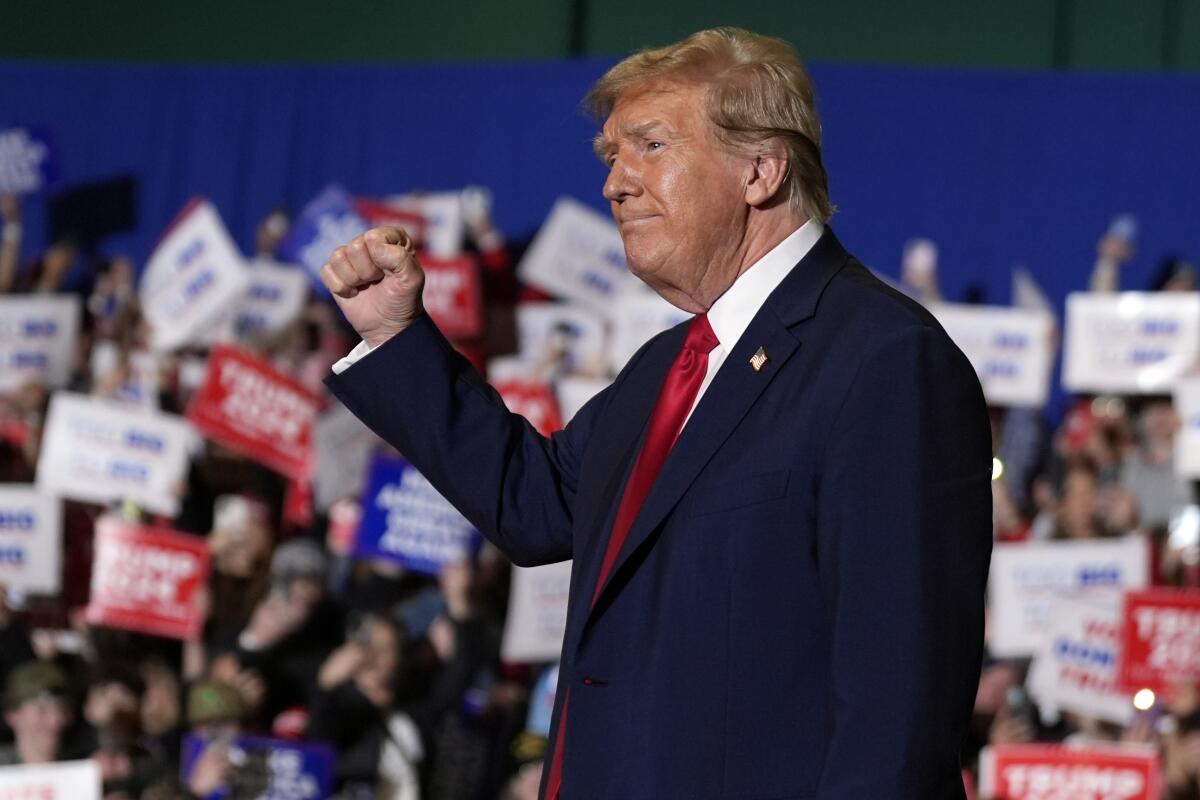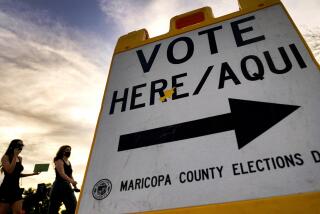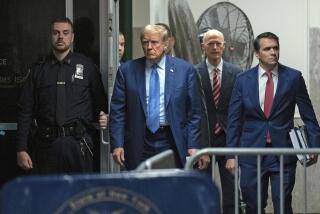Supreme Court rules Trump will stay on Colorado ballot despite Jan. 6 attack

WASHINGTON — The Supreme Court ruled Monday that former President Trump may not be disqualified from appearing on state ballots despite allegations he “engaged in insurrection” after losing the 2020 election and thereby should be barred under the Constitution from holding office.
Reversing a ruling by Colorado judges, the high court said states do not have the authority to interpret the post-Civil War 14th Amendment or use it to remove a presidential candidate from the state ballot.
In an unsigned, unanimous decision, justices said they feared the presidential election would turn into a “patchwork” if “a single candidate would be declared ineligible in some states, but not others, based on the same conduct.”
In December, the Colorado Supreme Court decided that Trump was disqualified from running for president because he violated Section 3 of the 14th Amendment. It says no person may “hold any office, civil or military” who took an oath to support the Constitution and then engaged in “insurrection or rebellion” against the United States.
Legal scholars and historians told the court in friend-of-the-court briefs that the Reconstruction Congress sought to prevent “insurrectionists” from gaining power and subverting American democracy.
The justices did not dispute that reading of history, but they appeared more concerned about allowing state judges to remove from the ballot a candidate who is the overwhelming choice of Republican voters.
“Because the Constitution makes Congress, rather than the states, responsible for enforcing Section 3 against federal officeholders and candidates, we reverse,’’ the court said Monday in Trump vs. Anderson.
All nine justices said they agreed that Colorado or any state may not disqualify a presidential candidate based on the 14th Amendment.
But liberal Justices Sonia Sotomayor, Elena Kagan and Ketanji Brown Jackson, and one conservative, Justice Amy Coney Barrett, objected — in separate concurring opinions — to part of the court’s ruling that said Congress must enact a law to enforce this provision in the 14th Amendment.
“Today, the majority goes beyond the necessities of this case to limit how Section 3 can bar an oath-breaking insurrectionist from becoming president. Although we agree that Colorado cannot enforce Section 3, we protest the majority’s effort to use this case to define the limits of federal enforcement of that provision. Because we would decide only the issue before us, we concur only in the judgment,” the court’s three liberals wrote in their joint opinion.
The court’s conservatives appear determined to foreclose the possibility that Trump could face a challenge in Congress if he wins the election in November, and Democrats win control of the House and Senate.
If that happens, some have questioned whether Congress could refuse to certify Trump’s election by saying he had “engaged in insurrection” in violation of the 14th Amendment.
The court’s opinion says the power to enforce Section 3 “rests with Congress and not the states,” but it also says Congress must “pass appropriate legislation to enforce” this provision.
The liberals objected to the majority’s statement that “a disqualification for insurrection can occur only when Congress enacts a particular kind of legislation pursuant to Section 5 of the 14th Amendment.”
“We cannot join an opinion that decides momentous and difficult issues unnecessarily, and we therefore concur only in the judgment,” the liberal justices wrote.
Barrett filed a separate concurrence but did not take a stand on the question of whether federal legislation was required to enforce this part of the 14th Amendment.
“I agree that states lack the power to enforce Section 3 against presidential candidates. That principle is sufficient to resolve this case, and I would decide no more than that.... In my judgment, this is not the time to amplify disagreement with stridency. The court has settled a politically charged issue in the volatile season of a presidential election. Particularly in this circumstance, writings on the court should turn the national temperature down, not up. For present purposes, our differences are far less important than our unanimity: All nine Justices agree on the outcome of this case. That is the message Americans should take home.”
The court moved with uncommon speed to hear Trump’s appeal and to rule for him. His lawyers asked the court to review the Colorado case Jan. 3. Two days later, the appeal was granted, and arguments were held Feb. 8.
The justices ruled for Trump in less than a month and in time for his votes to be counted in Colorado’s primary election Tuesday.
The court has moved less quickly to resolve Trump’s separate claim of presidential immunity from prosecution. As a result, the criminal trial over his role in the Jan. 6 insurrection may not be held until after the November election.
Last week, the court announced it would hear Trump’s immunity claim, setting arguments for the week of April 22. Under that schedule, the justices are unlikely to rule before June.
By then, it may be too late for the trial to be held before the November election.
The court’s Monday opinion does not discuss or decide whether Trump engaged in insurrection after losing the election in November 2020.
The lawyers who brought the suit in Colorado on behalf of several Republican voters called that a victory of sorts.
“While the Supreme Court allowed Donald Trump back on the ballot on technical legal grounds, this was in no way a win for Trump. The Supreme Court had the opportunity in this case to exonerate Trump, and they chose not to do so,” said Noah Bookbinder, president of Citizens for Responsibility and Ethics in Washington or CREW.
Election law experts also noted the Colorado decision may not prevent members of Congress and others from objecting to Trump’s election if he wins in November.
“This decision does not resolve the contentious insurrection issues, which will remain live and disputed in the public domain in the months ahead,” said Derek Muller, a Notre Dame law professor. “But it shuts the door on any exclusion of Trump from the ballot in any state, either in the primary or the general.”
More to Read
Get the L.A. Times Politics newsletter
Deeply reported insights into legislation, politics and policy from Sacramento, Washington and beyond. In your inbox three times per week.
You may occasionally receive promotional content from the Los Angeles Times.











